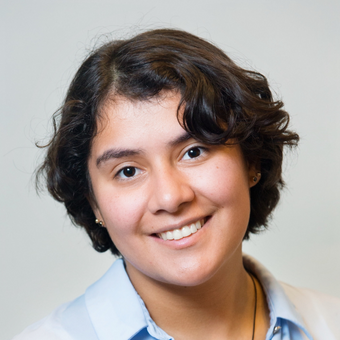
What excites me most about bioengineering work is the possibility for treating complex neurological diseases.
Fischell Department of Bioengineering (BIOE) senior Viviana Alpizar-Vargas has gravitated toward STEM her whole life. From a young age, she loved the science fair, science museums, and science documentaries. This continued into high school when she developed an interest in neurodegenerative diseases such as multiple sclerosis.
“I was curious to understand why these diseases happened, but what captivated me the most was the fact that there were no treatments to reverse them,” she said. “When I began at UMD, I built my career in such a way that I could study these diseases while also learning the fundamentals to research treatments in the future.”
In addition to BIOE, Alpizar-Vargas is also studying neuroscience. By combining the two major Alpizar-Vargas realized she could learn the mechanisms that drive brain function while simultaneously exploring how to engineer biological systems to treat complex diseases. Alpizar-Vargas noted that balancing the two degrees – and her research – can prove challenging, but her passion for these topics has made the workload manageable. Alpizar-Vargas has also found that the curricula across both degree programs are often complementary, which makes it easier for her to grasp the material across both.
“What excites me most about bioengineering work is the possibility for treating complex neurological diseases,” Alpizar-Vargas said. “Understanding these diseases is crucial, but it is most important to me to give patients hope that they can, one day, live a healthy life.”
Alpizar-Vargas noted that working in BIOE Professor Alisa Clyne’s Vascular Kinetics Laboratory with M.D./Ph.D. student Bilal Moiz, in particular, has been an incredibly educational experience, through which Alpizar-Vargas has learned the fundamentals of conducting research in a lab while also learning the nuances of complex vascular and metabolic mechanisms.
On Oct. 11, Alpizar-Vargas took home the first-place poster prize at the University of Maryland’s Bioscience Day event in recognition for her research titled “Cholesterol Depletion Increases Nanogel Uptake in iPSC Derived Brain Microvascular Endothelial Cells.” Alpizar-Vargas investigated nanogel uptake in Niemann Pick Disease Type C (NPC),a rare neurodegenerative disease in which cholesterol becomes trapped in the lysosome and the cell membrane is depleted of cholesterol.
Alpizar-Vargas also presented her research at the 2022 Biomedical Engineering Society (BMES) conference in San Antonio, Texas. Alpizar-Vargas felt that presenting at BMES was a scary but an exciting experience – a new milestone in her academic career. While at BMES, Alpizar-Vargas also presented a rapid-fire talk during the LatinXinBME’s “Rising Latinx Voices” event, alongside 12 other Latinx or Hispanic researchers. Alpizar-Vargas said that these experiences gave her a better understanding of how to effectively communicate her research findings and how to answer complex questions about her research.
After earning her Ph.D, Alpizar-Vargas would like to gain industry experience in therapeutic research. Further down the line, she would like to go back to academia and become a professor. Alpizar-Vargas added that her dream is to one day establish a university lab in order to further research into the mechanisms that drive neurodegeneration.
Alpizar-Vargas said that she wishes her younger self had known how important it is to believe in herself. “Both [the bioengineering and neuroscience disciplines] are full of intelligent students and it is easy to become overwhelmed by the incredible people around you, especially in research,” she said. “It is important to focus on your path and to find people who will support you through the challenging moments.”
Alpizar-Vargas advises students not to be afraid to reach out to those around them. “Don’t be afraid to ask questions,” she said. “It is likely that you’re not the only one who needs further explanation.”
Top